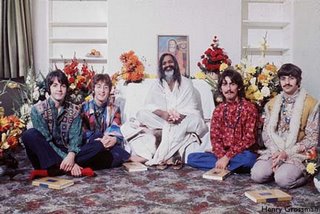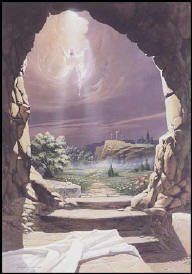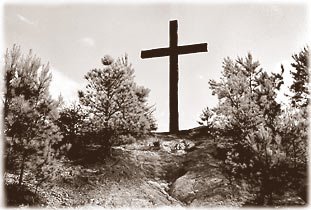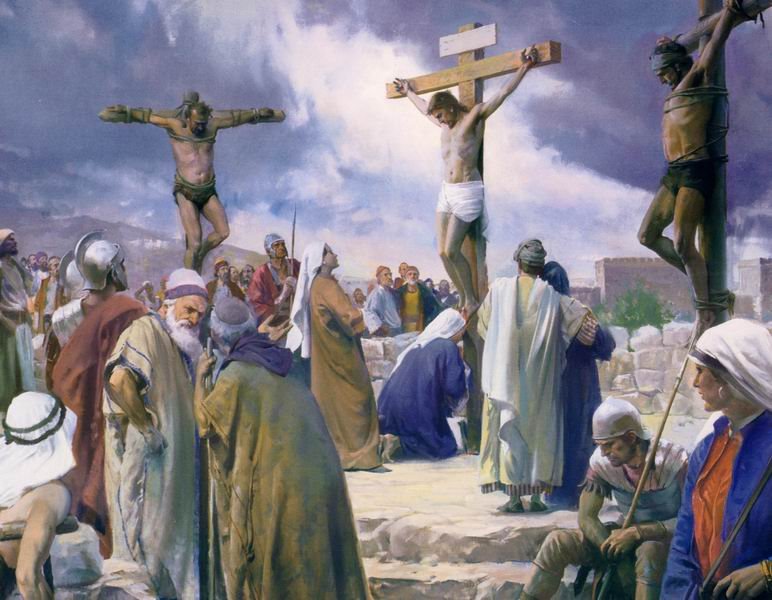 To follow are excerpts from Charles Spurgeon's sermon entitled,
To follow are excerpts from Charles Spurgeon's sermon entitled,
"The Resurrection of Our Lord Jesus," which was delivered on April 9, 1882.
Click here to read the entire sermon.
“Remember that Jesus Christ of the seed of David was raised from the dead according to my gospel.”--
2 Timothy 2:8
Our present text is found in Paul’s second letter to Timothy. The venerable minister is anxious about the young man who has preached with remarkable  success, and whom he regards in some respects as his successor. The old man is about to put off his tabernacle, and he is concerned that his son in the gospel, should preach the same truth as his father has preached, and should by no means adulterate the gospel. A tendency showed itself in Timothy’s day, and the same tendency exists at this very hour, to try to get away from the simple matters of fact upon which our religion is built, to something more philosophical and hard to be understood. The word which the common people heard gladly is not fine enough for cultured sages, and so they must needs surround it with a mist of human thought and speculation.
success, and whom he regards in some respects as his successor. The old man is about to put off his tabernacle, and he is concerned that his son in the gospel, should preach the same truth as his father has preached, and should by no means adulterate the gospel. A tendency showed itself in Timothy’s day, and the same tendency exists at this very hour, to try to get away from the simple matters of fact upon which our religion is built, to something more philosophical and hard to be understood. The word which the common people heard gladly is not fine enough for cultured sages, and so they must needs surround it with a mist of human thought and speculation.
This Jesus Christ was really and truly man; for Paul says he was “of the seed of David.” True he was divine, and his birth was not after the ordinary manner of men, but still he was in all respects partaker of our human nature, and came of the stock of David. This also we do believe. We are not among those who spiritualize the incarnation, and suppose that God was here as a phantom, or that the whole story is but an instructive legend. Nay, in very flesh and blood did the Son of God abide among men: bone of our bone and flesh of our flesh was he in the days of his sojourn here below. We know and believe that Jesus Christ has come in the flesh. We love the incarnate God, and in him we fix our trust.
It is implied, too, in the text that Jesus died; for he could not be raised from the dead if he had not first gone down among the dead, and been one of them. Yes, Jesus died: the crucifixion was no delusion, the piercing of his side with a spear was most clear and evident proof that he was dead: his heart was pierced, and the blood and water flowed from there. As a dead man he was taken down from the cross and carried by gentle hands, and laid in Joseph’s virgin tomb. I think I see that pale corpse, white as a lily. Mark how it is distained with the blood of his five wounds, which make him red as the rose. See how the holy women tenderly wrap him in fine linen with sweet spices, and leave him to spend his Sabbath all alone in the rock hewn sepulcher. No man in this world was ever more surely dead than he. “He made his grave with the wicked and with the rich in his death.” As dead they laid him in the place of the dead, with napkin and grave clothes, and habiliments fit for a grave then they rolled the great stone at the grave’s mouth and left him, knowing that he was dead.
Then comes the grand truth, that as soon as ever the third sun commenced his shining circuit Jesus rose again. His body had not decayed, for it was not possible for that holy thing to see corruption; but still it had been dead; and by the power of God by his own power, by the Father’s power, by the power of the Spirit for it is attributed to each of these in turn, before the sun had risen his dead body was quickened. The silent heart began again to beat, and through the stagnant canals of the veins the lifeblood began to circulate. The soul of the Redeemer again took possession of the body, and it lived once more. There he was within the sepulcher, as truly living as to all parts of him as he had ever been. He literally and truly, in a material body, came forth from the tomb to live among men till the hour of his ascension into heaven. This is the truth which is still to be taught, refine it who may, spiritualize it who dare. This is the historical fact which the apostles witnessed; this is the truth for which the confessors bled and died. This is the doctrine which is the keystone of the arch of Christianity, and they that hold it not have cast aside the essential truth of God. How can they hope for salvation for their souls if they do not believe that “the Lord is risen indeed”?
This morning I wish to do three things. First, let us consider the bearings of the resurrection of Christ upon other great truths; secondly, let us consider the bearings of this fact upon the gospel, for it has such bearings, according to the text--“Jesus Christ of the seed of David was raised from the dead according to my gospel”; thirdly, let us consider its bearings on ourselves, which are all indicated in the word” Remember.”
I. First, then, beloved, as God shall help us, let us CONSIDER THE BEARINGS OF THE FACT THAT JESUS ROSE FROM THE DEAD.
It is clear at the outset that the resurrection of our Lord was a tangible proof that there is another life.
His resurrection is also a pledge that the body will surely live again and rise to a superior condition; for the body of our blessed Master was no phantom after death any more than before.
Secondly, Christ’s rising from the dead was the seal to prove his claims.
Dear friends, the rising of Christ from the dead proved that this man was innocent of every sin. He could not be held by the bands of death, for there was no sin to make those bands fast. Corruption could not touch his pure body, for no original sin had defiled the Holy One. Death could not keep him a continual prisoner, because he had not actually come under sin; and though he took sin of ours, and bore it by imputation, and therefore died, yet he had no fault of his own, and must, therefore, be set free when his imputed load had been removed. Moreover, Christ’s rising from the dead proved his claim to Deity. We are told in another place that he was proved to be the Son of God with power by the resurrection from the dead. He raised himself by his own power, and though the Father and the Holy Spirit were cooperative with him, and hence his resurrection is ascribed to them, yet it was because the Father had given him to have life in himself, that therefore he arose from the dead. Oh, risen Savior, thy rising is the seal of thy work! We can have no doubt about thee now that thou hast left the tomb. Prophet of Nazareth, thou art indeed the Christ of God, for God has loosed the bands of death for thee! Son of David, thou art indeed the elect and precious One, for thou ever lives! Thy resurrection life has set the sign manual of heaven to all that thou hast said and done, and for this we bless and magnify thy name.
A third bearing of his resurrection is this, and it is a very grand one,--The resurrection of our Lord, according to Scripture, was the acceptance of his sacrifice.
Bear with me while I notice, next, another bearing of this resurrection of Christ. It was a guarantee of his people’s resurrection.
There is a great truth that never is to be forgotten, namely, that Christ and his people are one just as Adam and all his seed are one. That which Adam did he did as a head for a body, and as our Lord Jesus and all believers are one, so that which Jesus did he did as a head for a body. We were crucified together with Christ, we were buried with Christ, and we are risen together with him; yea, he hath raised us up together and made us sit together in the heavenly places in Christ Jesus. He says, “Because I live ye shall live also.” If Christ be not raised from the dead your faith is vain, and our preaching is vain, and ye are yet in your sins, and those that have fallen asleep in Christ have perished, and you will perish too; but if Christ has been raised from the dead then all his people must be raised also; it is a matter of gospel necessity. There is no logic more imperative than the argument drawn from union with Christ. God has made the saints one with Christ, and if Christ has risen all the saints must rise too. My soul takes firm hold on this and as she strengthens her grasp she loses all fear of death. Now we bear our dear ones to the cemetery and leave them each one in his narrow cell, calmly bidding him farewell and saying:
"So Jesus slept: God’s dying Son
Passed through the grave, and blest the bed
Rest here, dear saint, till from His throne
The morning breaks and pierce the shade.”
Once more, our Lord’s rising from the dead is a fair picture of the new life which all believers already enjoy.
Now, just as Jesus Christ led, after his resurrection, a life very different from that before his death, so you and I are called upon to live a high and noble spiritual and heavenly life, seeing that we have been raised from the dead to die no more.
Let us joy and rejoice in this. Let us behave as those who are alive from the dead, the happy children of the resurrection. Do not let us be money grubbers, or hunters after worldly fame. Let us not set our affections on the foul things of this dead and rotten world, but let our hearts fly upward, like young birds that have broken loose of their shells fly upward towards our Lord and the heavenly things upon which he would have us set our minds. Living truth, living work, living faith, these are the things for living men: let us cast off the grave clothes of our former lusts, and wear the garments of light and life. May the Spirit of God help us in further meditating upon these things at home.
II. Now, secondly, LET US CONSIDER THE BEARINGS OF THIS FACT OF THE RESURRECTION UPON THE GOSPEL; for Paul says, “Jesus Christ was raised from the dead according to my gospel.”
I always like to see what way any kind of statement bears on the gospel. I may not have many more opportunities of preaching, and I make up my mind to this one thing, that I will waste no time upon secondary themes, but when I do preach it shall be the gospel, or something very closely bearing upon it. I will endeavor each time to strike under the fifth rib, and never beat the air. Those who have a taste for the superfluities may take their fill of them, it is for me to keep to the great necessary truths by which men’s souls are saved. My work is to preach Christ crucified and the gospel, which gives men salvation through faith. I hear every now and then of very taking sermons about some bright new nothing or another. Some preachers remind me of the emperor who had a wonderful skill in carving men’s heads upon cherry stones. What a multitude of preachers we have who can make wonderfully fine discourses out of a mere passing thought, of no consequence to anyone. But we want the gospel. We have to live and die, and we must have the gospel. Certain of us may be cold in our graves before many weeks are over, and we cannot afford to toy and trifle: we want to see the bearings of all teachings upon our eternal destinies, and upon the gospel which sheds its light over our future.
The resurrection of Christ is vital, because first it tells us that the gospel is the gospel of a living Savior.
We have not to send poor penitents to the crucifix, the dead image of a dead man. We say not, “These be thy gods, O Israel!” We have not to send you to a little baby Christ nursed by a woman. Nothing of the sort. Behold the Lord that lives and was dead and is alive for evermore, and hath the keys of hell and of death! Behold in him a living and accessible Savior who out of the glory still cries with loving accents, “Come unto me, all ye that labor and are heavy laden, and I will give you rest.” “He is able also to save them to the uttermost that come unto God by him, seeing he ever lives to make intercession for them.” I say we have a living Savior, and is not this a glorious feature of the gospel?
Notice next that we have a powerful Savior in connection with the gospel that we preach; for he who had power to raise himself from the dead, has all power now that he is raised, he who in death vanquishes death, can much more conquer by his life.
And now notice, that we have the gospel of complete justification to preach to you.
We do not come and say, “Brethren, Jesus Christ by his death did something by which men may be saved if they have a mind to be, and diligently carry out their good resolves.” No, no; we say Jesus Christ took the sin of his people upon himself and bore the consequences of it in his own body on the tree, so that he died; and having died, and so paid the penalty, he lives again; and now all for whom he died, all his people whose sins he bore, are free from the guilt of sin. You ask me, “Who are they?” and I reply, as many as believe on him. Whosoever believeth in Jesus Christ is as free from the guilt of sin as Christ is. Our Lord Jesus took the sin of his people, and died in the sinner’s stead, and now being himself set free, all his people are set free in their Representative. This doctrine is worth preaching. One may well rise from his bed to talk about perfect justification through faith in Christ Jesus. One might as well keep asleep as rise to say that Jesus accomplished little or nothing by his passion and his rising. Some seem to dream that Jesus made some little opening by which we have a slight chance of reaching pardon and eternal life, if we are diligent for many years. This is not our gospel. Jesus has saved his people. He has performed the work entrusted to him. He has finished transgression, made an end of sin, and brought in everlasting righteousness, and whosoever believeth in him is not condemned, and never can be.
Once again, the connection of the resurrection and the gospel is this, it proves the safely of the saints, for if when Christ rose his people rose also, they rose to a life like that of their Lord, and therefore they can never die.
It is written,” Christ being raised from the dead dies no more; death hath no more dominion over him,” and it is so with the believer: if you have been dead with Christ and are risen with Christ, death has no more dominion over you; you shall never go back to the beggarly elements of sin, you shall never become what you were before your regeneration. You shall never perish, neither shall any pluck you out of Jesus’ hand. He has put within you a living and incorruptible seed which lives and abides for ever. He says himself, “The water that I shall give him shall be in him a well of living water springing up unto everlasting life.” Wherefore hold ye fast to this, and let the resurrection of your Lord be the pledge of your own final perseverance.
III. And so I come to my last head, and to the practical conclusion: THE BEARING OF THIS RESURRECTION UPON OURSELVES.
Paul expressly bids us “Remember” it. “Why,” says one, “we don’t forget it.” Are you sure you do not? I find myself far too forgetful of divine truths. We ought not to forget, for this first day of the week is consecrated to constrain us to think of the resurrection. On the seventh day men celebrated a finished creation, on the first day we celebrate a finished redemption. Bear it, then, in mind. Now, if you will remember that Jesus Christ of the seed of David rose from the dead, what will follow?
First, you will find that most of your trials will vanish.
Next remember Jesus, for then you will see how your present sufferings are as nothing compared with his sufferings, and you will learn to expect victory over your sufferings even as he obtained victory.
Kindly look at the chapter, and you will find the apostle there saying in the third verse, “Thou therefore endure hardness, as a good soldier of Jesus Christ,” and further on in the eleventh verse, “It is a faithful saying: For if we be dead in him, we shall also live in him: if we suffer, we shall also reign with him.” Now, then, when you are called to suffer, think, “Jesus suffered, yet Jesus rose again from the dead; he came up out of his baptism of griefs the better and more glorious for it, and so shall I!” Wherefore go you into the furnace at the Lord’s bidding, and do not fear that the smell of fire shall pass upon you. Go you even down into the grave, and do not think that the worm shall make an end of you any more than it did of him. Behold in the risen One the type and model of what you are and are to be! Wherefore fear not, for he conquered! Stand not trembling, but march boldly on, for Jesus Christ of the seed of David rose from the dead, and you who are of the seed of the promise shall rise again from all your trials and afflictions, and live a glorious life.
Next remember Jesus, for then you will see how your present sufferings are as nothing compared with his sufferings, and you will learn to expect victory over your sufferings even as he obtained victory.
Did you ever get, where Bunyan pictures Christian as getting, right under the old dragon’s foot? He is very heavy, and presses the very breath out of a fellow when he makes him his footstool. Poor Christian lay there with the dragon’s foot on his breast; but he was just able to stretch out his hand and lay hold on his sword, which, by a good providence, lay within his reach. Then he gave Apollyon a deadly thrust, which made him spread his dragon wings and fly away. The poor crushed and broken pilgrim, as he gave the stab to his foe, cried, “Rejoice not over me, O mine enemy; though I fall, yet shall I rise again. Brother, do you the same. You that are near despair, let this be the strength that nerves your arm and steels your heart. “Jesus Christ of the seed of David was raised from the dead according to Paul’s gospel .”
Lastly, this proves the futility of all opposition to Christ.
The learned are going to destroy the Christian religion. Already, according to their boastings, it has pretty nearly come to an end. The pulpit is effete, it cannot command public attention. We stand up and preach to empty benches! As you see or do not see. Nothing remains for us but to die decently, so they insinuate. And what then? When our Lord was dead, when the clay-cold corpse lay, watched by the Roman soldiery, and with a seal upon the enclosing stone, was not the cause in mortal jeopardy? But how fared it? Did it die out? Every disciple that Jesus had made forsook him, and fled, was not Christianity then destroyed? Nay, that very day our Lord won a victory which shook the gates of hell, and caused the universe to stand astonished. Matters are not worse with him at this hour! His affairs are not in a sadder condition today than then. Nay, see him today and judge. On his head are many crowns, and at his feet the hosts of angels bow! Jesus is the master of legions today, while the Caesars have passed away! Here are his people needy, obscure, despised, I grant you, still, but assuredly somewhat more numerous than they were when they laid him in the tomb. His cause is not to be crushed, it is for ever rising. Year after year, century after century, bands of true and honest hearts are marching up to the assault of the citadel of Satan. The prince of this world has a stronghold here on earth, and we are to capture it; but as yet we see small progress, for rank after rank the warriors of the Lord have marched to the breach and disappeared beneath the terrible fire of death. All who have gone before seem to have been utterly cut off and destroyed, and still the enemy holds his ramparts against us. Has nothing been done, think you? Has death taken away those martyrs, and confessors, and preachers, and laborious saints, and has nothing been achieved? Truly if Christ were dead I would admit our defeat, for they that are fallen asleep in him would have perished: but as the Christ lives so the cause lives, and they that have fallen are not dead: they have vanished from our sight for a little, but if the curtain could be withdrawn every one of them would be seen to stand in his lot unharmed, crowned, victorious! “Who are these arrayed in white robes, and whence came they?” These are they that were defeated! Whence, then, their crowns? These are they that were dishonored! Whence then their white robes? These are they who clung to a cause which is overthrown. Whence then their long line of victors, for there is not a vanquished man among them all? Let the truth be spoken. Defeat is not the word for the cause of Jesus, the Prince of the house of David. We have always been victorious, brethren; we are victorious now. Follow your Master on your white horses, and be not afraid! I see him in the front with his bloodstained vesture around him, fresh from the winepress where he has trodden down his foes. You have not to present atoning blood, but only to conquer after your Lord. Put on your white raiment and follow him on your white horses, conquering and to conquer. He is nearer than we think, and the end of all things may be before the next jibe shall have come forth from the mouth of the last new skeptic. Have confidence in the risen One, and live in the power of his resurrection. Amen.


 So, (to borrow from Tom Ascol's technique), can't we "Get Back" to using true worship songs in our worship services? "I Don't Want to Spoil The Party," but come on.......isn't there "Something" wrong with this picture? Can someone "Tell Me Why" this type of thing is beginning to occur in churches "Here, There, and Everywhere?" I wish I could say "I'm Only Sleeping," and this is just a dream. I'm praying the seeker-friendly movement would "Slow Down," but "I've Got a Feeling" we'll be seeing more and more of this practice. Some seem to think "You've Got to Hide Your Love Away" in some watered-down form of the gospel. Hopefully, the response this worship service received was feeble enough that they attempt it "Not A Second Time." Sure, "There's A Place" for the Beatles' tunes, but I just don't believe it's in the house of God. ____________________________________________________________
So, (to borrow from Tom Ascol's technique), can't we "Get Back" to using true worship songs in our worship services? "I Don't Want to Spoil The Party," but come on.......isn't there "Something" wrong with this picture? Can someone "Tell Me Why" this type of thing is beginning to occur in churches "Here, There, and Everywhere?" I wish I could say "I'm Only Sleeping," and this is just a dream. I'm praying the seeker-friendly movement would "Slow Down," but "I've Got a Feeling" we'll be seeing more and more of this practice. Some seem to think "You've Got to Hide Your Love Away" in some watered-down form of the gospel. Hopefully, the response this worship service received was feeble enough that they attempt it "Not A Second Time." Sure, "There's A Place" for the Beatles' tunes, but I just don't believe it's in the house of God. ____________________________________________________________
















 Our Lord's suffering in this particular form was appropriate and necessary. It would not have sufficed for our Lord merely to have been pained in body, nor even to have been grieved in mind in other ways: He must suffer in this particular way. He must feel forsaken of God, because this is the necessary consequence of sin. For a man to be forsaken of God is the penalty which naturally and inevitably follows upon His breaking His relation with God. What is death? What was the death that was threatened to Adam? "In the day that thou eatest thereof thou shalt surely die." Is death annihilation? Was Adam annihilated that day? Assuredly not: he lived many a year afterwards. But in the day in which he ate of the forbidden fruit he died, by being separated from God. The separation of the soul from God is spiritual death; just as the separation of the soul from the body is natural death. The sacrifice for sin must be put in the place of separation, and must bow to the penalty of death. By this placing of the Great Sacrifice under forsaking and death, it would be seen by all creatures throughout the universe that God could not have fellowship with sin. If even the Holy One, who stood the Just for the unjust, found God forsaking him, what must the doom of the actual sinner be! Sin is evidently always, in every case, a dividing influence, putting even the Christ Himself, as a sin-bearer, in the place of distance.
Our Lord's suffering in this particular form was appropriate and necessary. It would not have sufficed for our Lord merely to have been pained in body, nor even to have been grieved in mind in other ways: He must suffer in this particular way. He must feel forsaken of God, because this is the necessary consequence of sin. For a man to be forsaken of God is the penalty which naturally and inevitably follows upon His breaking His relation with God. What is death? What was the death that was threatened to Adam? "In the day that thou eatest thereof thou shalt surely die." Is death annihilation? Was Adam annihilated that day? Assuredly not: he lived many a year afterwards. But in the day in which he ate of the forbidden fruit he died, by being separated from God. The separation of the soul from God is spiritual death; just as the separation of the soul from the body is natural death. The sacrifice for sin must be put in the place of separation, and must bow to the penalty of death. By this placing of the Great Sacrifice under forsaking and death, it would be seen by all creatures throughout the universe that God could not have fellowship with sin. If even the Holy One, who stood the Just for the unjust, found God forsaking him, what must the doom of the actual sinner be! Sin is evidently always, in every case, a dividing influence, putting even the Christ Himself, as a sin-bearer, in the place of distance.
